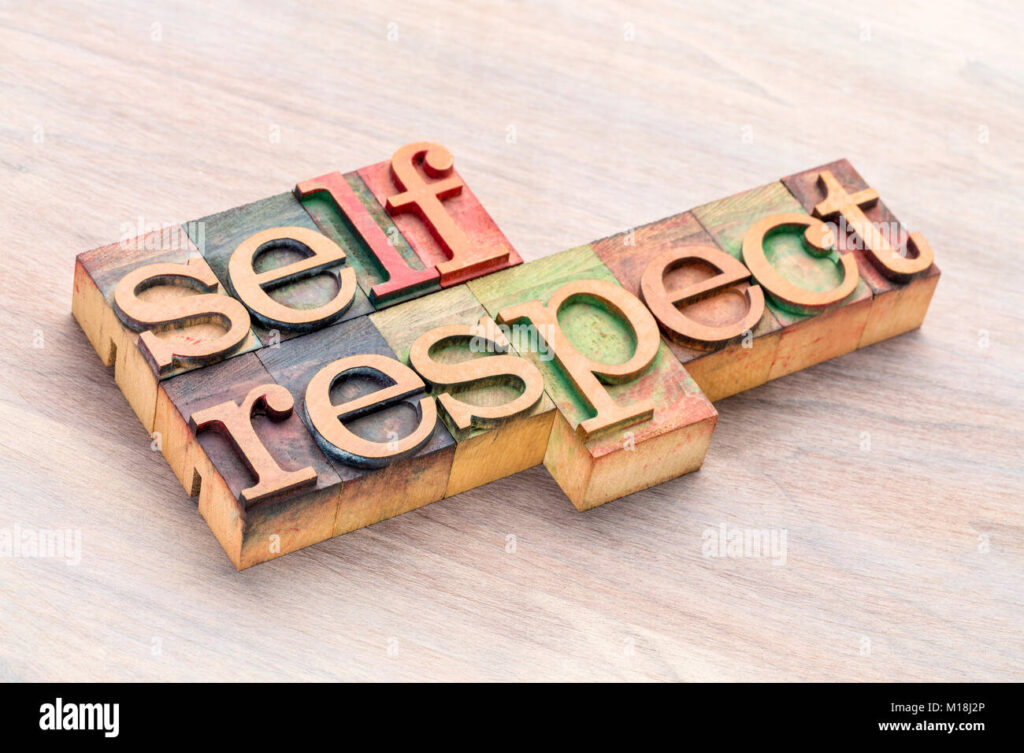Self-respect is one of the cornerstones of a happy and meaningful life. It influences the way you view yourself, the way others treat you, and how you navigate through the challenges and opportunities that life presents. Yet, many people struggle with maintaining or even recognizing their self-respect, often mistaking it for pride or arrogance. Understanding what self-respect truly is, how to cultivate it, and why it matters can make a profound difference in your life.
In this article, we’ll explore self-respect from various angles, delve into its impact on our personal and professional lives, and offer practical steps to develop and maintain it. Whether you’re someone who is just beginning to explore the concept or you’re looking to deepen your understanding, this guide will provide the insights you need.
What is Self-Respect?
At its core, self-respect is about valuing yourself—your thoughts, feelings, and actions. It’s the acknowledgment that you deserve to be treated with kindness, consideration, and dignity, not only by others but also by yourself. This is not about inflating your ego or feeling superior to others; instead, it’s about recognizing your worth as an individual and maintaining a healthy relationship with yourself.
Self-respect allows you to set boundaries, say “no” when necessary, and avoid compromising your values just to please others. It empowers you to take charge of your life while treating others with fairness and respect in return.

Why Is Self-Respect Important?
Self-respect is fundamental to your overall well-being. When you respect yourself, you are more likely to make choices that reflect your values, care for your mental and physical health, and foster healthy relationships. Here are some key reasons why self-respect is so crucial:
- Emotional Well-Being: When you respect yourself, you avoid letting negative thoughts, self-doubt, or criticism from others take over your mind. You’re more resilient and able to cope with setbacks, understanding that your worth is not defined by external circumstances.
- Healthy Boundaries: People with self-respect are less likely to tolerate disrespect, manipulation, or toxic behavior from others. Setting boundaries becomes easier because you recognize what you deserve, and you’re not afraid to enforce those limits.
- Confidence and Independence: Self-respect gives you the confidence to stand by your decisions, take responsibility for your actions, and pursue your goals without constantly seeking validation from others. You become more independent, relying on your inner strength rather than approval from the outside world.
- Positive Relationships: People who respect themselves are more likely to form healthy, mutually respectful relationships. They avoid codependency, manipulation, or settling for less than they deserve, leading to more fulfilling personal and professional connections.
The Difference Between Self-Respect and Pride
It’s important to clarify that self-respect and pride are not the same things. Pride, particularly when it’s excessive or misplaced, can lead to arrogance and a sense of superiority over others. It’s often based on external achievements or status and can be fragile, easily crumbling when faced with failure or criticism.
Self-respect, on the other hand, is internal and grounded in who you are, not what you’ve accomplished. It doesn’t depend on outside recognition or success. With self-respect, you can acknowledge your strengths and weaknesses without judgment and continue to grow without feeling the need to prove yourself to others.
How to Cultivate Self-Respect
Building self-respect is a gradual process that requires conscious effort and a shift in mindset. Here are some practical steps to help you nurture and maintain self-respect:
1. Acknowledge Your Worth
The first step in developing self-respect is recognizing that you are inherently valuable. Your worth is not determined by your achievements, wealth, or appearance. Practice self-compassion by treating yourself kindly, especially when you make mistakes.
2. Set Healthy Boundaries
Learn to say “no” without guilt. Setting boundaries is an essential part of respecting yourself, as it prevents others from taking advantage of you. It also ensures that you’re giving your time and energy to the people and activities that align with your values.
3. Don’t Seek Validation from Others
It’s natural to want approval, but constantly seeking validation from others can erode your self-respect. Instead, focus on self-approval. Trust your judgment, make decisions based on your values, and be comfortable with your choices, even if they’re unpopular.
4. Hold Yourself Accountable
Self-respect also involves taking responsibility for your actions. Own your mistakes and learn from them rather than blaming others or making excuses. When you hold yourself accountable, you show that you value your integrity and are committed to personal growth.
5. Surround Yourself with Supportive People
The people you surround yourself with can significantly impact your self-respect. Choose friends and partners who respect you and encourage your growth. Avoid those who constantly criticize, belittle, or manipulate you.
6. Practice Self-Care
Taking care of your physical, mental, and emotional health is a form of self-respect. Exercise regularly, eat nutritious foods, get enough rest, and engage in activities that nourish your soul. By caring for yourself, you reinforce the belief that you deserve to feel good.
7. Embrace Your Uniqueness
Stop comparing yourself to others. Your journey is your own, and trying to measure your worth by someone else’s standards is a surefire way to undermine your self-respect. Celebrate your unique qualities and achievements, and focus on what makes you, you.
The Role of Self-Respect in Personal Relationships
Self-respect plays a critical role in how we relate to others. In friendships, romantic relationships, and even family dynamics, mutual respect is key to long-lasting, healthy connections. Here’s how self-respect influences these relationships:
- Avoiding Toxic Dynamics: When you respect yourself, you’re less likely to tolerate mistreatment or stay in toxic relationships. You understand that you deserve to be treated with kindness and fairness, and you’re willing to walk away if those standards aren’t met.
- Fostering Mutual Respect: Self-respect naturally leads to respecting others. In a healthy relationship, both parties honor each other’s boundaries, communicate openly, and support one another’s personal growth.
- Better Communication: When you value yourself, you communicate more assertively, expressing your needs and desires without fear of judgment. This openness leads to better understanding and stronger relationships overall.
Overcoming Obstacles to Self-Respect
It’s not always easy to maintain self-respect, especially if you’ve experienced low self-esteem, criticism, or rejection in the past. Here are some common obstacles and how to overcome them:
1. Negative Self-Talk
Many people struggle with an inner voice that constantly criticizes or doubts them. Combat this by practicing positive affirmations and reframing your thoughts. Whenever you catch yourself being self-critical, challenge those thoughts with evidence of your strengths and achievements.
2. Past Mistakes
Dwelling on past mistakes can erode your self-respect. Remember, everyone makes mistakes—it’s part of being human. Instead of fixating on what went wrong, focus on what you’ve learned and how you can do better in the future.
3. External Criticism
While constructive feedback can be valuable, not all criticism is helpful. Learn to distinguish between feedback that promotes growth and criticism that is simply hurtful. Don’t internalize negative comments from others; instead, use them as opportunities for reflection and improvement.
FAQs on Self-Respect
Q1: Can self-respect be developed over time? Yes, self-respect can definitely be developed. It’s a skill that can be nurtured with practice and self-awareness. Start by setting small, achievable goals to build your confidence and gradually strengthen your self-respect.
Q2: How does self-respect affect my mental health? Self-respect has a profound impact on mental health. It promotes positive self-esteem, reduces anxiety, and helps you cope with stress. When you respect yourself, you’re more likely to prioritize your well-being and seek help when needed.
Q3: What’s the difference between self-respect and self-esteem? While they are closely related, self-esteem refers to how you feel about yourself, while self-respect is about how you treat yourself. You can have high self-esteem but still struggle with self-respect if you allow others to treat you poorly or make decisions that don’t align with your values.
Q4: Can self-respect improve my relationships? Absolutely. When you respect yourself, you attract healthier, more respectful relationships. You set the standard for how others should treat you, and you’re more likely to engage in balanced, respectful interactions.
Q5: What are some signs of low self-respect? Signs of low self-respect include consistently putting others’ needs before your own, tolerating mistreatment, struggling to set boundaries, and seeking validation from others. It can also manifest as negative self-talk and a reluctance to stand up for yourself.
Q6: How can I help someone else develop self-respect? Encouragement and support are key. Help them recognize their worth by affirming their strengths and encouraging them to set boundaries. Be a role model by showing what self-respect looks like in practice.
Conclusion
Self-respect is a powerful tool for personal growth, happiness, and fulfillment. It affects every aspect of your life, from your relationships to your mental health and professional success. By learning to value yourself, setting boundaries, and cultivating a healthy mindset, you can build a foundation of self-respect that will support you through life’s challenges. Remember, self-respect is not something you earn through accomplishments; it’s something you deserve just by being you.


